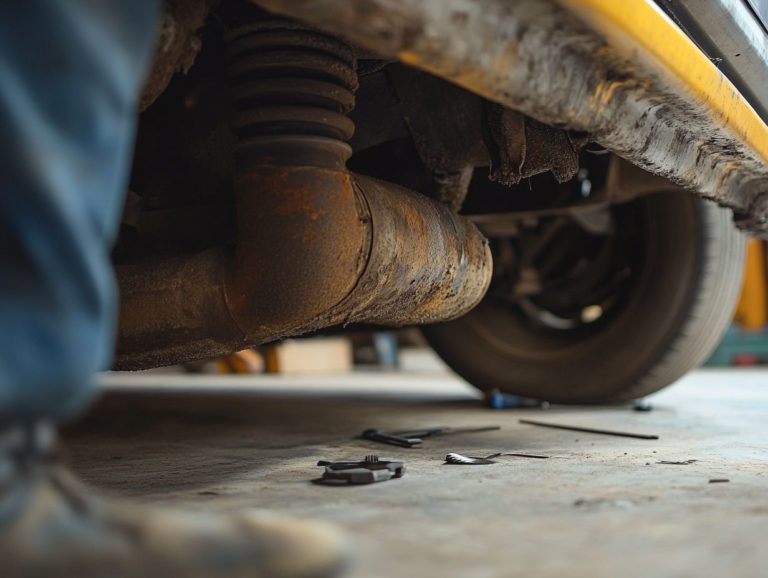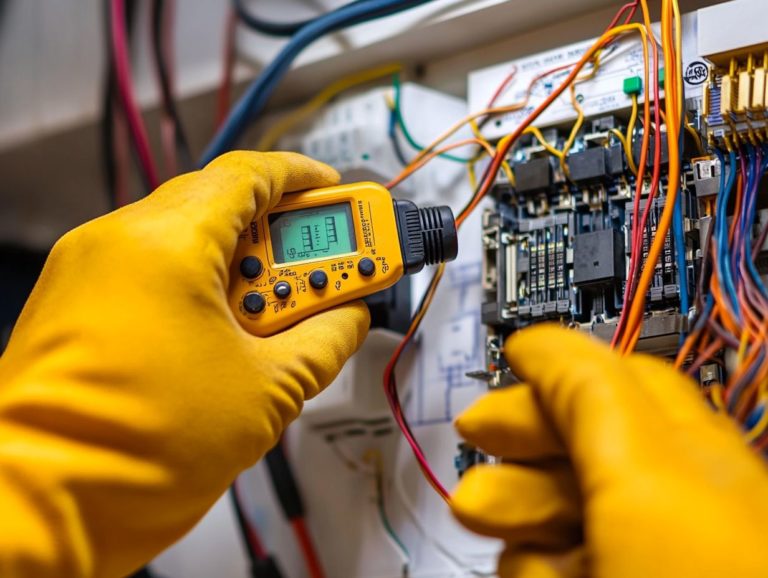What Is the Role of a Fuel Filter?
A fuel filter is integral to your vehicle s performance, safeguarding it from dirt, debris, and contaminants. This vital component enables your engine to operate more smoothly and efficiently.
By grasping how fuel filters function, recognizing the various types available, and identifying the signs of a clogged filter, you can significantly enhance your vehicle s longevity.
This guide delves into the essentials of fuel filters explaining their purpose, advising on when to replace them, and offering tips to keep them in peak condition.
Contents
Key Takeaways:

- A fuel filter is an essential part of your vehicle’s engine system that prevents dirt, debris, and other contaminants from reaching the engine and causing damage.
- There are two main types of fuel filters – in-line and canister. In-line filters are cheaper and easier to replace, while canister filters offer better filtration and a longer lifespan.
- Keep your vehicle running strong by regularly checking and replacing a clogged fuel filter to ensure proper functioning and avoid potential engine problems. Keeping the fuel filter clean can also help prolong its lifespan and improve performance.
Understanding the Purpose of a Fuel Filter
A fuel filter is essential for preserving the health and performance of both gasoline and diesel engines. It safeguards against contaminants like rust particles, debris, and water that can obstruct fuel flow, thereby protecting important engine parts such as fuel injectors and the fuel pump.
Regularly inspecting and replacing a clogged filter is crucial for achieving optimal engine efficiency and longevity. A dirty filter can compromise fuel quality and disrupt smooth fuel delivery.
To ensure peak performance, vehicle owners should prioritize the refurbishment and maintenance of their fuel systems, following the guidance laid out in the vehicle manual.
What Does a Fuel Filter Do?
A fuel filter serves a critical purpose: it removes contaminants from the fuel before it can reach vital engine components like fuel injectors.
This essential component diligently traps dirt, rust, and other microscopic particles that could disturb the smooth flow of fuel. It s also key in filtering out water contamination, which can cause corrosion and significant engine damage over time.
By ensuring that only clean, high-quality fuel reaches the engine, the filter plays an essential role in enhancing overall engine performance, improving combustion efficiency, and reducing harmful emissions.
A pristine fuel supply not only helps maintain your engine’s optimal health but also contributes to better fuel economy, ultimately saving you both time and money.
Types of Fuel Filters
Fuel filters are available in several types, predominantly in-line fuel filters and canister fuel filters. Each type plays a unique and essential role within the fuel system of your vehicle, regardless of whether it operates on gasoline or diesel.
In-Line Fuel Filters
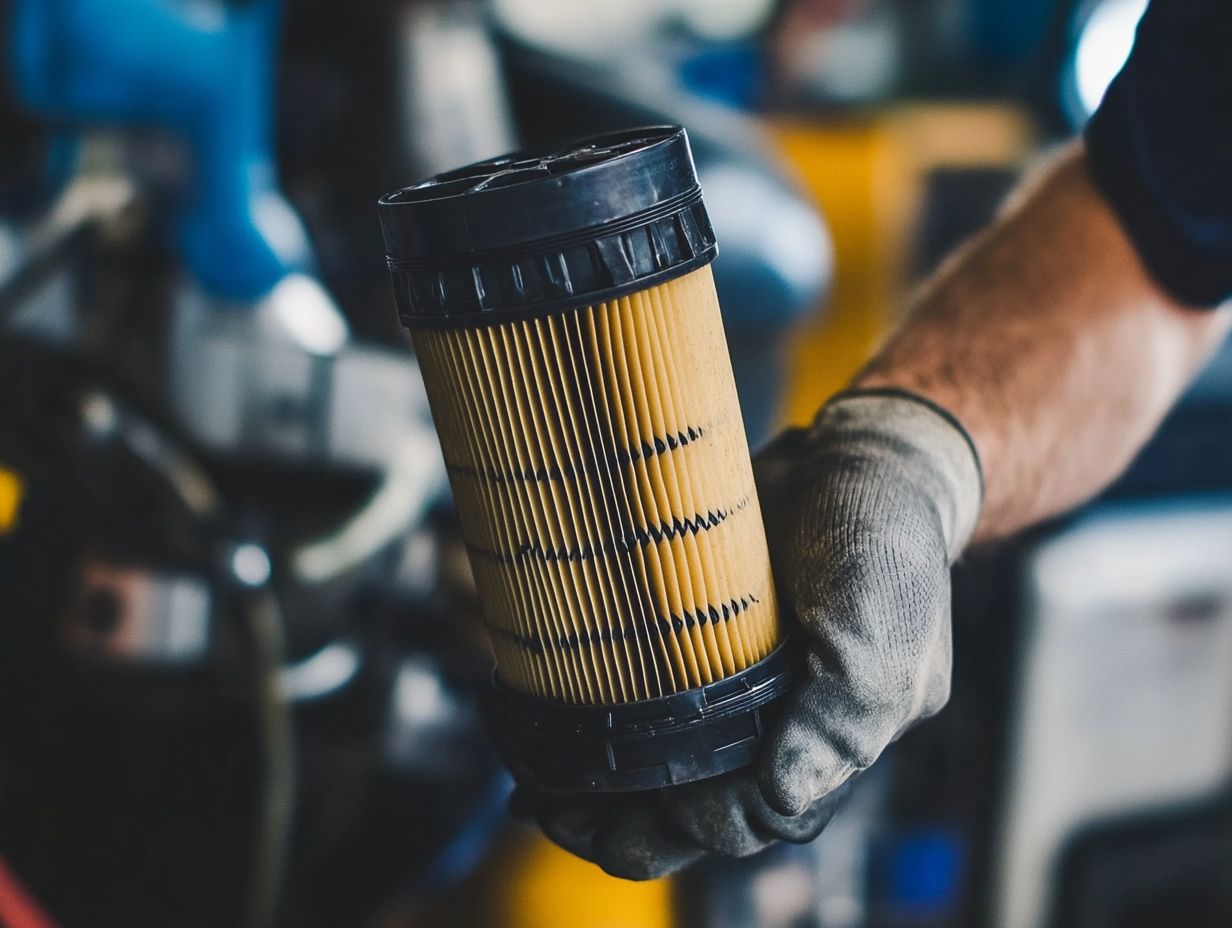
In-line fuel filters are essential components of your vehicle’s fuel delivery system, nestled between the fuel tank and the engine to efficiently eliminate contaminants before they can wreak havoc on your engine.
This critical function ensures that only clean fuel makes its way to the engine, promoting smoother operation and heightened efficiency.
Typically designed to trap dirt, rust, and other particles, these filters play a vital role in preventing wear and tear on fuel injectors and pumps components that can be quite costly to replace.
Don t wait! Regular maintenance is crucial for your vehicle s health; most experts suggest checking or replacing the fuel filter every 30,000 to 50,000 miles, depending on your vehicle and driving conditions. Failing to stay on top of this upkeep could lead to clogged filters and restricted fuel flow, ultimately diminishing your engine’s performance and fuel economy.
Canister Fuel Filters
Canister fuel filters are a premium option for filtration. They often use special materials that filter fuel better, managing higher volumes of fuel and contaminants to ensure a thorough cleaning of your fuel system.
These filters have a cylindrical structure, which provides a larger surface area. This design enhances their ability to trap dirt and impurities, significantly reducing the risk of engine damage from debris. This leads to better performance and a longer lifespan for your vehicle!
It s essential to establish a regular replacement schedule based on the manufacturer s recommendations. Be mindful of driving conditions that might require more frequent changes. Routine maintenance guarantees optimal filtration and supports the overall health of your fuel system, keeping your vehicle running smoothly!
Signs of a Clogged Fuel Filter
Recognizing a clogged fuel filter is vital to maintain engine performance and improve fuel efficiency. Here are some common symptoms that need your immediate attention:
Common Symptoms
- Decreased engine performance
- Difficulty starting
- Notable drops in fuel efficiency
When the fuel filter clogs, it restricts fuel flow to the engine, leading to reduced power and acceleration. You ll notice this especially in high-demand situations, such as merging onto highways or climbing steep hills, when your engine struggles for fuel.
Starting troubles can occur because the fuel pump has to work harder to push fuel through the blockage. This puts strain on the pump and can lead to its failure. A drop in fuel efficiency usually means the engine is burning more fuel to compensate for the lack of supply.
To keep your vehicle performing well, regular maintenance of the fuel filter is essential. Check and replace the filter as recommended by the manufacturer to prolong the life of your fuel system and enhance your engine s health!
Replacing a Fuel Filter
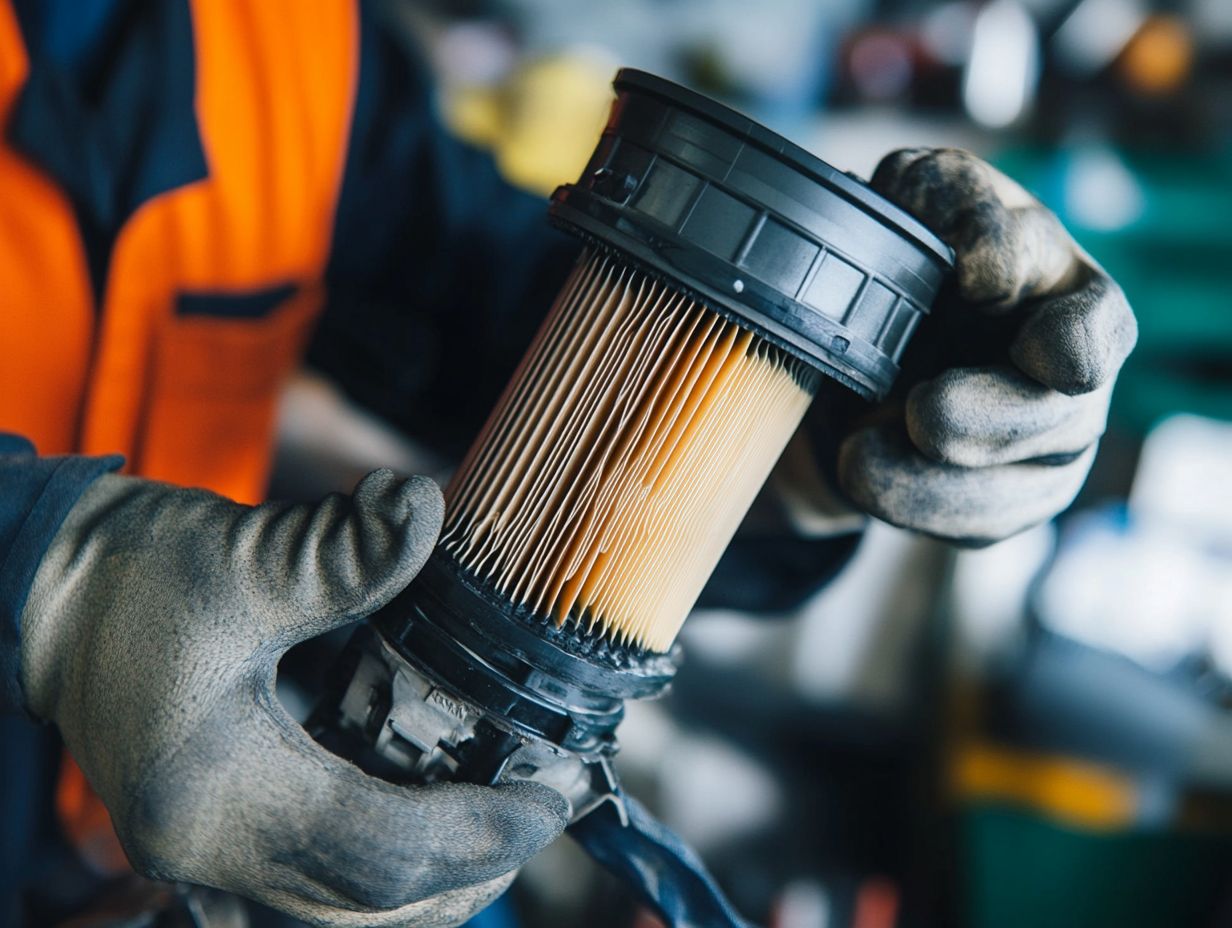
Replacing a fuel filter is an essential maintenance task you should follow according to your vehicle’s manual or maintenance schedule.
This careful attention ensures optimal engine performance and efficiency, keeping your vehicle operating at its best!
When and How to Replace
The fuel filter should be replaced when it becomes clogged or according to your vehicle’s maintenance schedule, typically every 20,000 to 30,000 miles. This maintenance is crucial for ensuring your fuel system operates efficiently and protects your engine from harmful debris and contaminants!
To replace the filter safely, gather some basic tools: a wrench set, safety goggles, gloves, and a clean cloth for spills. First, relieve the fuel system pressure to prevent mishaps. While you re at it, consider giving the fuel system a thorough cleaning to maintain optimal engine performance and extend its lifespan.
After installing the new filter, secure it properly and double-check all connections for a leak-free environment. This attention to detail will boost your confidence in your vehicle’s performance!
Maintaining Your Fuel Filter
Maintaining your fuel filter is crucial for its effectiveness in removing contaminants. This ultimately prolongs the lifespan of your vehicle’s fuel system.
Regular attention to your fuel filter and monitoring fuel quality is essential!
Take Action! Check your fuel filter today and ensure it’s in top shape for your vehicle!
Tips for Keeping Your Fuel Filter Clean
Keeping your fuel filter clean requires key maintenance practices. These practices are well worth your attention.
Consider using a fuel tank additive, a substance added to fuel to help clean the fuel system. Conduct regular inspections to identify potential issues before they impact your engine’s performance.
The quality of the fuel you choose plays a crucial role in the longevity of your filter. Opting for high-quality fuel with fewer impurities means less clogging and an extended lifespan for your filter.
Incorporating fuel tank additives works wonders by breaking down deposits and maintaining a cleaner fuel system overall. Check your filter regularly! Spotting wear or blockages early can save you from costly engine issues.
By adopting these straightforward practices, you can significantly enhance the efficiency and reliability of your fuel system, ensuring a smoother ride for the long haul.
Frequently Asked Questions
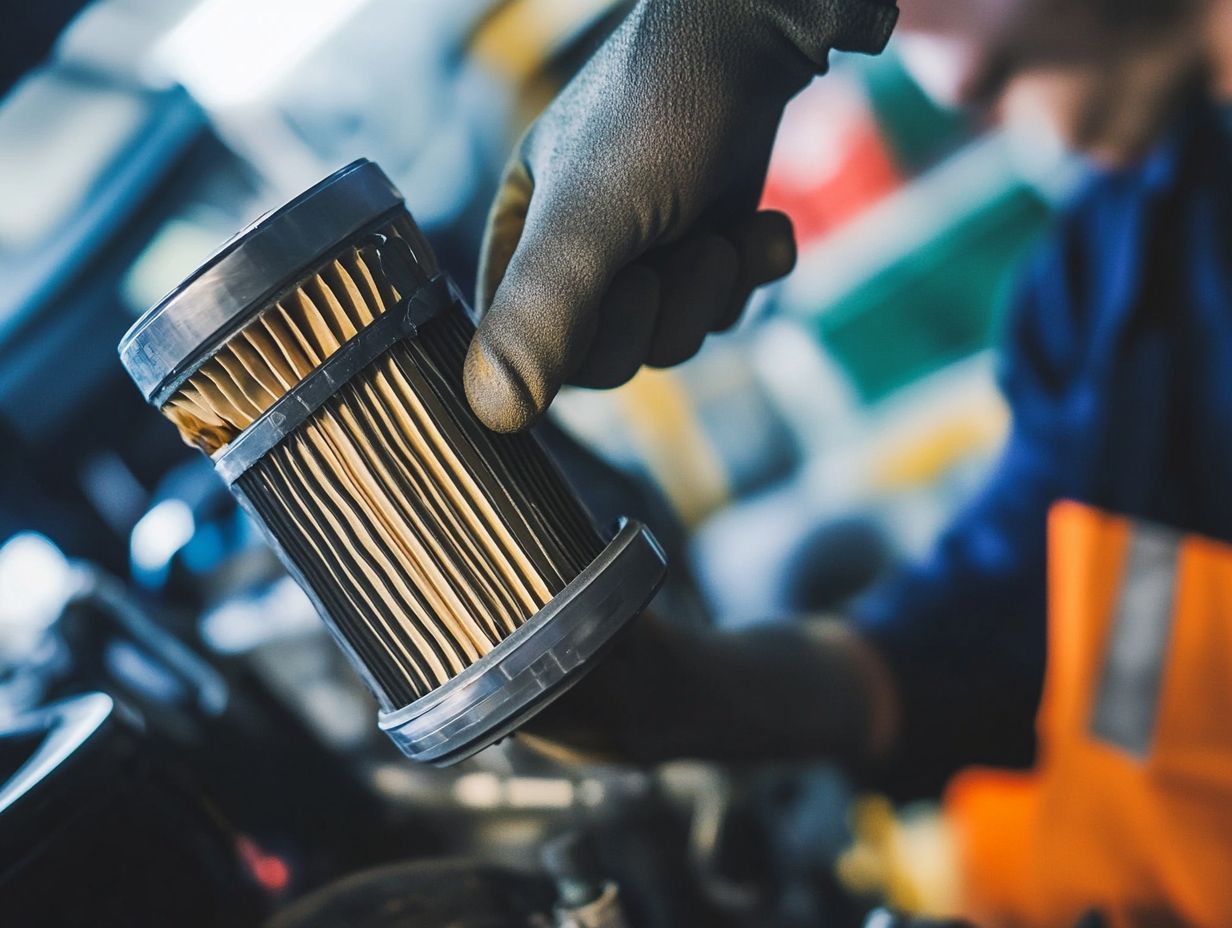
What Is the Role of a Fuel Filter?
The fuel filter keeps dirt and debris out of your engine. It’s a crucial component in a vehicle’s fuel system.
Why is a fuel filter necessary?
A fuel filter is necessary to prevent debris and particles from entering the engine, which can cause damage and decrease efficiency. It also helps maintain optimal performance and longevity of the engine.
How often should a fuel filter be replaced?
Replace the fuel filter every 20,000 to 30,000 miles, or as specified by the vehicle’s manufacturer. If you frequently drive in dusty or dirty conditions, you may need to replace it more often.
What are some signs of a clogged fuel filter?
Some common signs of a clogged fuel filter include difficulty starting the engine, reduced engine power, sputtering or stalling while driving, and decreased fuel efficiency. Don’t wait! If you notice these symptoms, get your fuel filter checked immediately.
Can a clogged fuel filter cause damage to the engine?
Yes, a clogged fuel filter can cause engine damage if left unaddressed for an extended period. A lack of fuel flow can result in engine misfires and potentially damage the fuel injectors.
Is it possible to clean a clogged fuel filter?
No, fuel filters are not meant to be cleaned. Once they become clogged, they must be replaced. Attempting to clean one can cause further damage or lead to ineffective filtering, harming the engine. Always replace the filter as recommended by the manufacturer.

